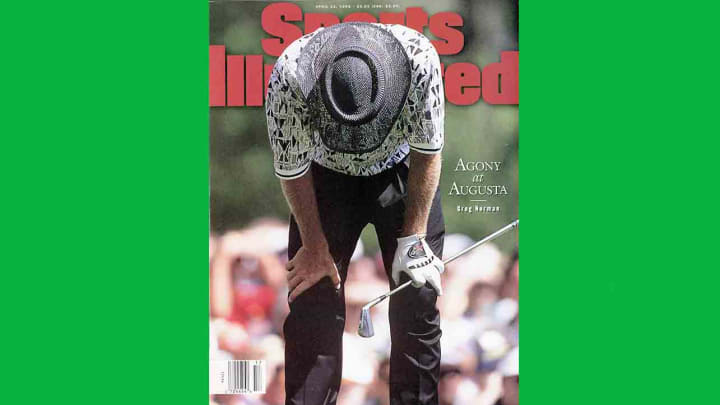From Rory McIlroy to Greg Norman, Notable Major Meltdowns of the Last 30 Years

Rory McIlroy’s finish to the U.S. Open was excruciating, a heartbreaking end to what appeared to be a fifth major triumph and an emphatic stamp on an already-Hall of Fame career.
McIlroy was two shots ahead with five holes to play. He had played better than anyone on the course, including eventual winner Bryson DeChambeau.
But he bogeyed three of the last four holes. He missed two short putts, including one at the last that—while tricky—was also one he needed, as it would have eventually put him in a playoff.
Instead, McIlroy could only watch as DeChambeau executed an incredible bunker shot on the final hole to set up his winning par putt.
It was the gut-punch of all calamities. But McIlroy is far from alone. Here are some of men's golf's other major meltdowns over the last 30 years .
2016 Masters: Jordan Spieth
Jordan Spieth had a five-shot lead with nine holes to play but lost six shots to par over the first three holes on the back nine, including a quadruple-bogey 7 on the 12th hole where he hit two balls in Rae’s Creek. Danny Willett shot a final-round 67 to Spieth’s 73 to win by three shots.
“It was a lack of discipline to hit it over the bunker coming off two bogeys, instead of recognizing I was still leading the Masters,” Spieth said. "It was a really tough 30 minutes for me that hopefully I never experience again.”
2015 U.S. Open: Dustin Johnson
Johnson was on the 18th green at Chambers Bay in two shots with a 15-footer for eagle and the win. He ran it by and it seemed a playoff was inevitable. Then he missed the short birdie putt and Jordan Spieth had won his second straight major that year, after the Masters.
“I did everything I was supposed to do,” Johnson said. “I hit the ball really well. I'm proud of the way I handled myself and the way I played today. I just really struggled getting it in the hole today. I didn't think I was hitting bad putts. I thought I was hitting them pretty good; they just weren't going in.”
2012 British Open: Adam Scott
Adam Scott had a four-shot lead with four holes to play at Royal Lytham & St. Anne’s and bogeyed them all. Ernie Els made a long birdie putt at the 18th several groups ahead of him to grab the clubhouse lead. When playing the 18th, Scott still had a chance to force a playoff but found a greenside bunker and then missed a 7-footer for par. Els had claimed his fourth major title.
“I managed to hit a poor shot on each of the four closing holes,” said Scott, who shot 75. “I played so beautifully for most of the week, I shouldn’t let it bring me down. I know I let a really great chance slip through my fingers today. I had it in my hands with four to go.”
2011 Masters: Rory McIlroy
Rory McIlroy led by four shots through 54 holes and still had a one-shot advantage on the 10th tee, where a horrible tee shot led to a triple-bogey 7 and a meltdown. He shot a final-round 80 and ended up 10 strokes back of winner Charl Schwartzel in a tie for 15th place.
“I was leading this golf tournament with nine holes to go, and I just unraveled … It’s a Sunday at a major, what it can do,” said McIlroy, who was 21 at the time. “This is my first experience at it, and hopefully the next time I’m in this position I’ll be able to handle it a little better. I didn’t handle it particularly well today obviously, but it was a character-building day … I’ll come out stronger for it.” McIlroy won the U.S. Open two months later.
2010 U.S. Open: Dustin Johnson
Dustin Johnson led by three strokes at the start of the day but playing with eventual winner Graeme McDowell, he made a triple bogey at the second hole, a double at the third and a bogey at the seventh to quickly fall out of contention. Several players, including Tiger Woods and Phil Mickelson, had life but it was McDowell who prevailed. Johnson shot 82 to tie for eighth while McDowell’s 74 gave him a one-shot win over Gregory Havret.
2009 British Open: Tom Watson
Tom Watson, 59, was bidding to become the oldest major champion by 11 years. It would have been his sixth Open title and first since 1983. And playing the 18th hole at Turnberry, he needed a par at the last hole to secure the Claret Jug. But his approach, which appeared perfect, landed hard on the green and rolled to the back fringe, from where he hit a mediocre putt and left himself an 8-footer for victory—that he missed. Watson then lost to Stewart Cink in a four-hole aggregate playoff.
“This ain’t a funeral, you know?” Watson quipped in the media center after his close call. “It would have been a hell of a story, wouldn't it? It would have been a hell of a story. It wasn't to be. And yes, it's a great disappointment. It tears at your gut, as it always has torn at my gut. It's not easy to take. I put myself in position to win, didn't do it in the last hole. In retrospect I probably would have hit a 9-iron rather than an 8-iron (into 18). I hit the 8-iron just the way I meant to. I was thinking 9, but I said, I'll hit an 8, and I caught it just the way I wanted to, and sure enough, it went too far.
“I chose to putt it from the short rough there. I just felt like I had better chance to get it close, and I looked at that upslope, looked like there was some grain in there, so I decided I was going to make sure I wasn't going to leave it short and sure, I gunned it on by and made a lousy putt. The playoff was just one bad shot after another, and Stewart did what he had to do to win. And I didn't give him much competition in the playoff.”
2006 U.S. Open: Phil Mickelson
Phil Mickelson led throughout the tournament but it was always close. He came to the 72nd hole with a one-shot lead over Geoff Ogilvy, who had finished earlier and was seemingly never in contention. Mickelson then airmailed his tee shot way left on Winged Foot’s closing hole, bounding off a hospitality tent and into the rough. From there, instead of electing to play out into the fairway, he went for the green and caught a big tree, leading to a double-bogey 6 when a 5 would have put him in a playoff the following day.
“Well, I still am in shock that I did that. I just can't believe that I did that. I am such an idiot,’’ Mickelson said. “I just couldn't hit a fairway all day. I just couldn't hit a fairway all day. I tried to go to my bread and butter shot, a baby carve slice on 18 and just get it in the fairway, and I missed it left. It was still okay, wasn't too bad. I just can't believe I couldn't par the last hole. It really stings.
“As a kid I dreamt of winning this tournament. I came out here and worked hard all four days, haven't made a bogey all week and then bogeyed the last hole. Even a bogey would have gotten me into a playoff. I just can't believe I did that.”
1999 British Open: Jean Van de Velde
France’s Jean Van de Velde had seemingly conquered the beast that was Carnoustie. He had a three-stroke lead with one hole to play over Justin Leonard and Paul Lawrie, both of whom had finished long before. Then things got crazy. With a difficult but manageable par-4 18th to play—where the Barry Burn meandered through the fairway twice—Van de Velde played recklessly. His tee shot with a driver went way right but was safe. His second shot with a 2-iron—when a layup would have been far better—clanked off a grandstand and much to his misfortune bonded backward into tall rough. Van de Velde played his third into the burn short of the green, briefly considered playing the ball from the water—the photo is classic—and then took a penalty drop before wedging into a greenside bunker for his fifth shot. He miraculously got it up and down for a triple-bogey 7 to get into a playoff, won by Lawrie.
“I didn’t feel comfortable hitting a wedge,” Van de Velde said afterward. “To me it was against the spirit of the game. I’m going to hit a wedge and then another wedge and then what? Then three-putt from 30 feet and win by one? O.K., fair enough, I would have won. But what a way to finish.”
1996 Masters: Greg Norman
Greg Norman was finally going to win the Masters after years of trying. He shot a first-round 63. He led by six shots going into the final round. Even for two-time champion Nick Faldo that was too much to overcome. Until it wasn’t. Norman’s lead was gone after the 12th hole, where he hit his tee shot in the water. He would shoot a final-round 78 to Faldo’s near-flawless 67, a six-shot lead turning into a five-shot deficit.
“I screwed up,” Norman said. "It's all on me. I know that. But losing this Masters is not the end of the world. I let this one get away, but I still have a pretty good life. I'll wake up tomorrow, still breathing, I hope. All these hiccups I have, they must be for a reason. All this is just a test. I just don't know what the test is yet.”
